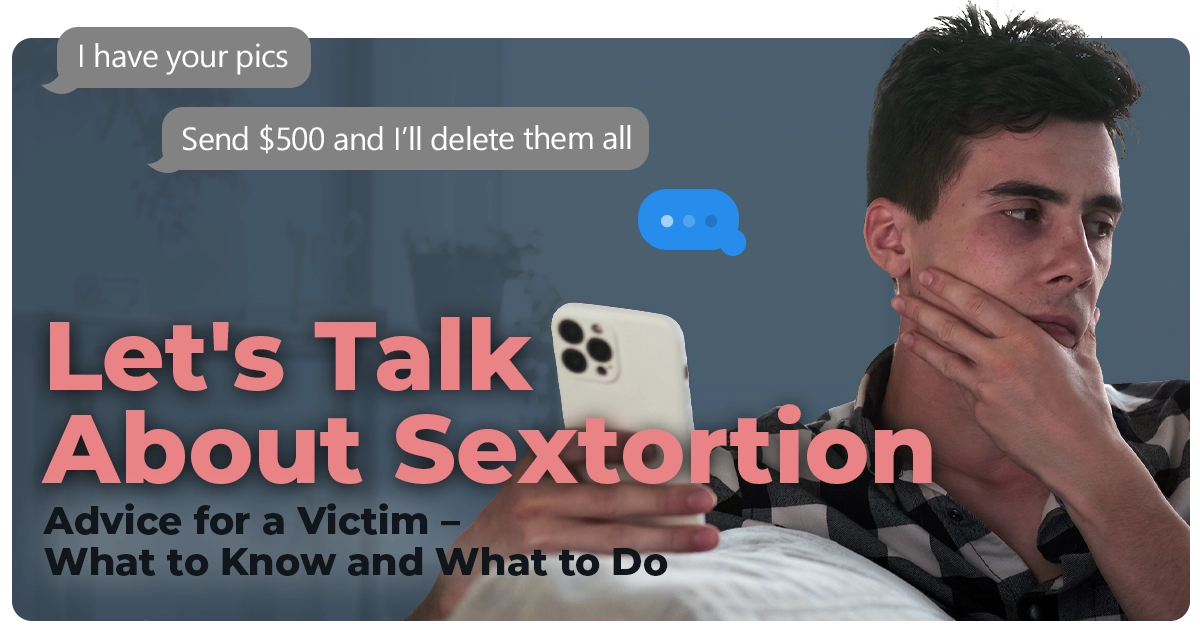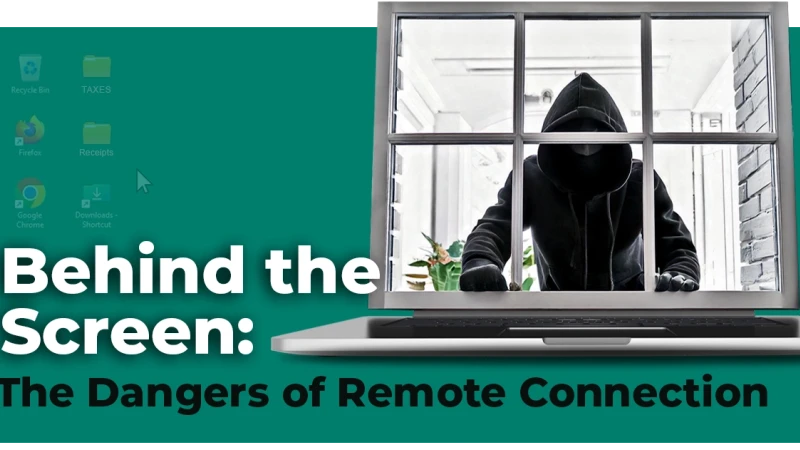If someone is threatening to share your private photos or videos unless you pay them, you are not alone. This guide will help you take back control and protect yourself, or someone you care about, from sextortion.
If you’re reading this, you or someone you know may be in a really tough situation and might not know what to do next or how to get help. Maybe you were chatting with someone online who seemed perfect – same interests, funny, caring, and they seem really into you.
They send some flirty messages and then things start to get even more personal when they send private pictures of themselves (which aren’t actually theirs, they’re stolen from another person’s OnlyFans or Pornhub account). Then, they pressure you to send some of your own back. Caught up in the moment and not wanting to disappoint your romantic interest, you took a few explicit pics and sent them.
Or maybe you received an email from someone claiming they have hacked your accounts, computer, or webcam and they have recorded you doing something embarrassing. They may have included your real name, your address, old passwords, and, in a more recent and creepy twist, maybe even a picture of where you live.
They likely got this information from data breaches, not from your actual accounts or devices, but they know a more targeted message has a better chance to get your attention.
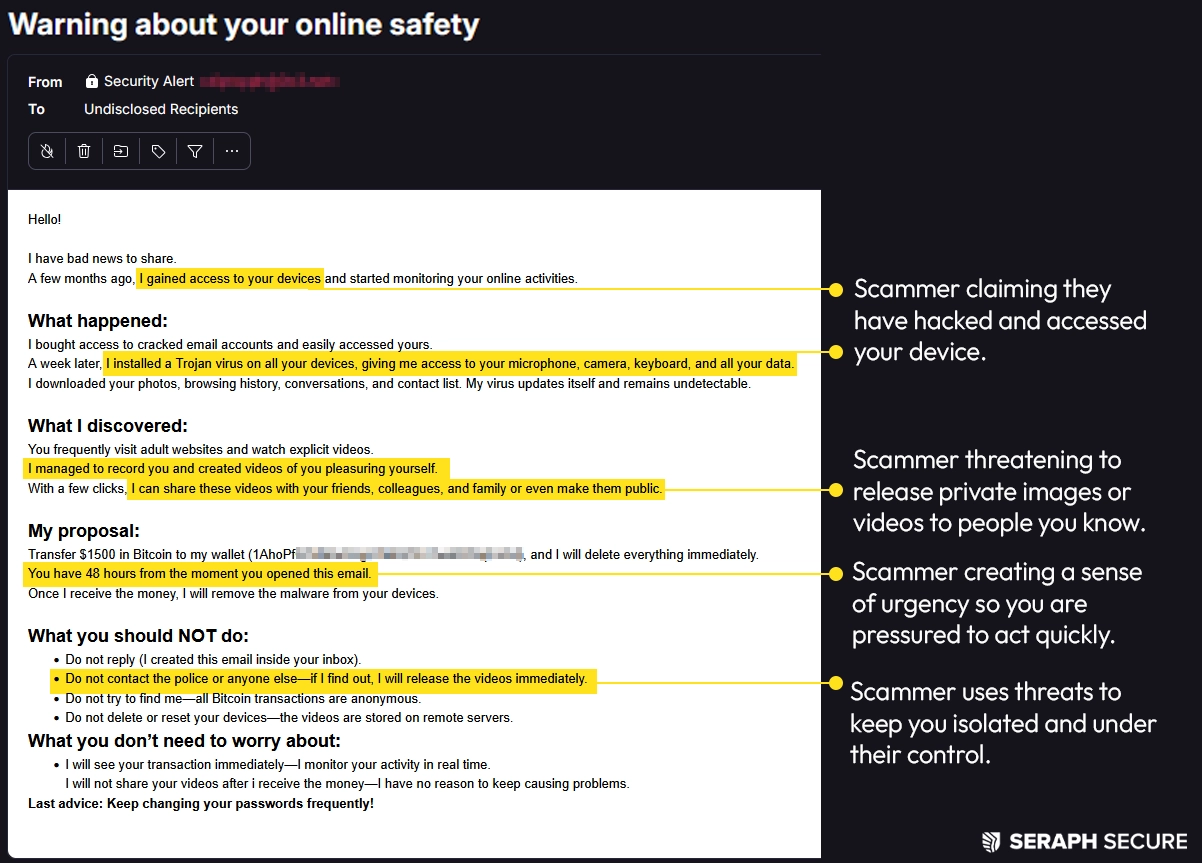
Then, a nightmare begins to unfold leaving you regretting everything and wishing you could take it all back. The scammer has revealed their true intentions. They have, or say they have, private images or videos of you and threaten to release those images or videos to your friends, family, or coworkers unless you do what they demand. You begin to panic thinking this is it, your life is over.
These sextortion scammers are sick and twisted, and their threats are designed to make you feel trapped, alone, terrified, and ashamed. But here’s the truth: you are not powerless, you are not to blame, and most importantly, you do not have to face this alone.
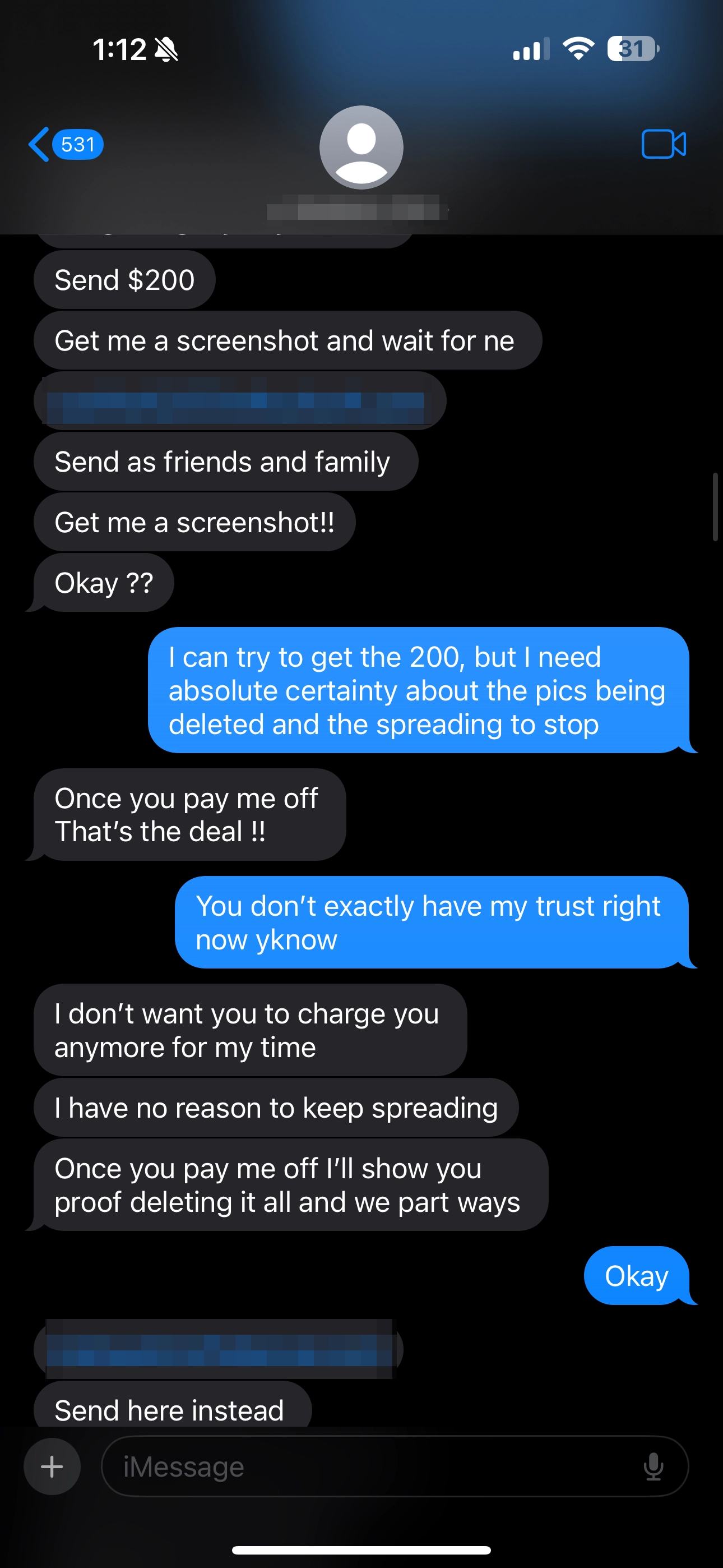
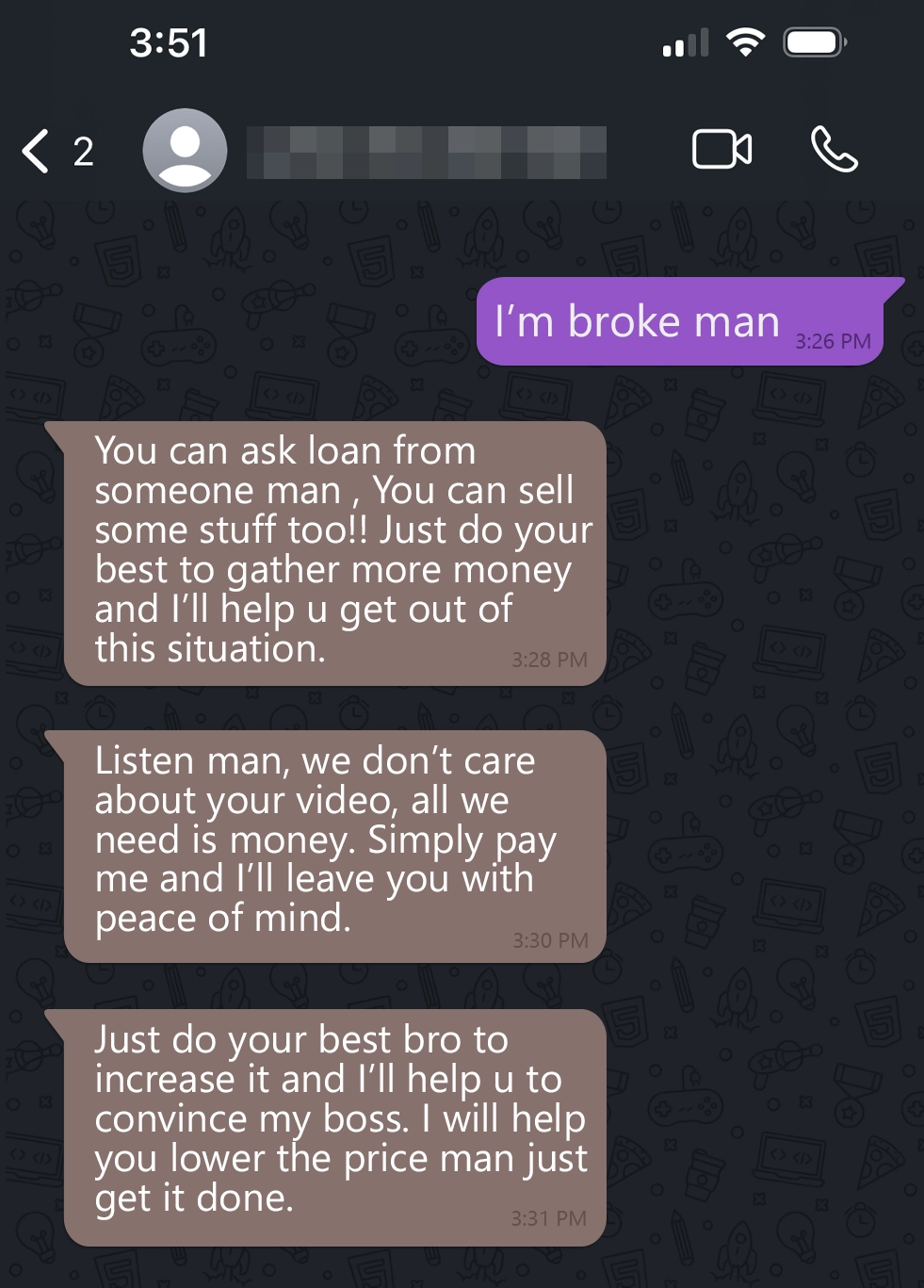

What is Sextortion?
Let’s start with the basics: sextortion is a form of blackmail where someone threatens to share explicit images, videos, or personal information about you unless you do what they demand. Scammers often say things like:
“I will send these out to everyone you know.”
“I can destroy your life”
“Respond quickly, or else your pictures will be shared”
“Send the money I asked for or I’ll expose you”
If the victim pays, it’s rarely the end. The scammer will usually escalate their threats and continue to ask for more money to trap the individual. Sextortion works because scammers prey on human emotions, especially fear. If they make you feel afraid, you’re more likely to comply with their demands.
You can never pay to make these scammers go away. Paying them only encourages them to keep exploiting you and they ALWAYS want more.
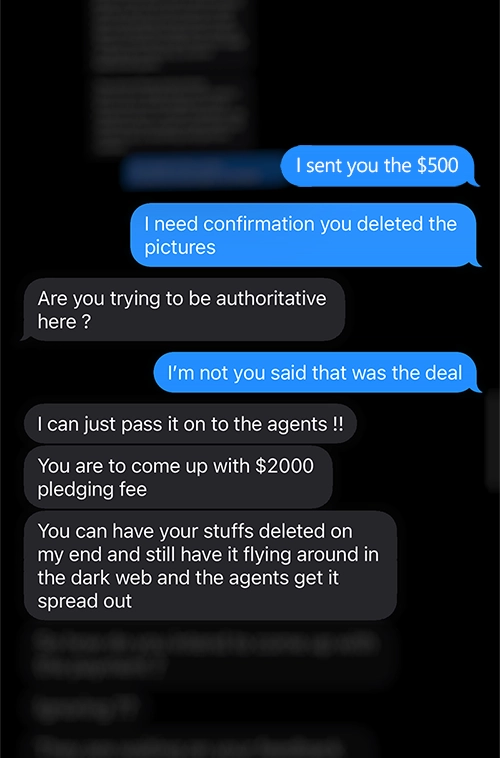
These scams are much more common than you might think. The number of sextortion scams is growing exponentially each year and due to the embarrassment and shame victims can feel, many don’t report it.
Sextortion can affect anyone regardless of race, ethnicity, age, or gender, though studies have shown they largely affect young men. The National Center for Missing & Exploited Children (NCMEC) has reported that a significant number of sextortion cases involve victims under the age of 18 where research published in the journal Sexual Abuse indicates that individuals in their teenage years and early twenties are at heightened risk.
Scammers take advantage of this age group by making the situation personal to the victim. Using information obtained from the victim’s social media accounts, they threaten to send the pictures to the victim’s school, organizations they belong to, or their social media followers.
Underage victims may be too afraid or ashamed to talk to their parents, leaving them feeling paralyzed by fear with no one to turn to and no other options.
Getting Help
If you find yourself in this situation, don’t be afraid to ask for help. Scammers are counting on you feeling dehumanized and ashamed, but the thing is, there’s no reason to feel that way. You are a victim who was taken advantage of by a criminal and that’s not your fault. You have more power than the person trying to control you and there are people who will believe you and stand with you.

If you’re underage, we know it can be awkward and uncomfortable, especially when it comes to talking to someone about an embarrassing situation. The potential consequences of what happened can seem unbearable, but suffering in silence only makes things worse. You have a lot of life left to live and remember, this too shall pass. If you’re afraid to talk to your parents, talk to a teacher, a coach, or a professional. Help is available and someone always has your back.
Advice From Scam Victim Advocates
We spoke with Cagney Phillips and Diana Prince from The AVAH Outreach Group, a scam victim outreach and advocacy group, to bring you advice from the experts who work every day with victims of scams – including victims of sextortion. They understand the sheer panic and hopelessness sextortion victims feel and know that desperation can drive them to want to take extreme actions like self-harm or taking their own lives.
Cagney says, “In these situations, it’s easier said than done, but don’t panic. If you need to, stay off the internet for a couple of days.”
She advises victims to stop communicating immediately with the scammer and block them, even if they’ve threatened you with consequences if you do that. If you’ve paid them, don’t pay anything more.
“The truth is 99.9% of the time, they won’t send out what they have because it’s more dangerous for them and they don’t want to get caught,” says Cagney. “They also lose any leverage they have over you if they do that. They want money and the moment they realize they’re not going to get it, they’ll move on to an easier target.”
She continues, “We often see scammers using platforms like Snapchat where the images they have of you disappear after a certain amount of time. They don’t want those images on their devices because it only increases their chances of getting caught.”
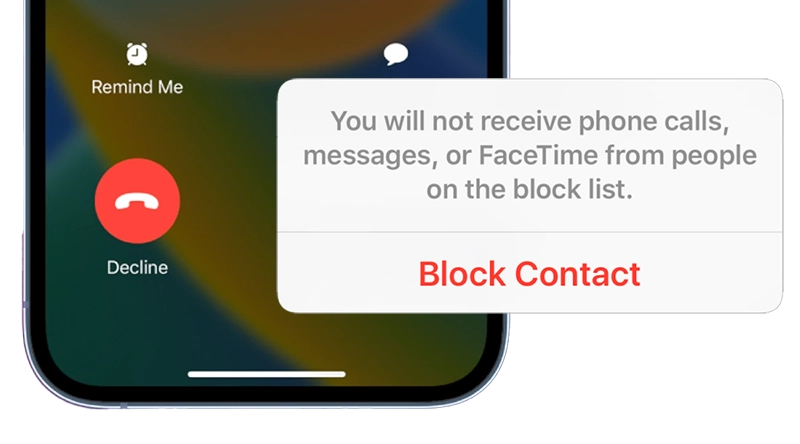
Locking Down Your Accounts
When victims are ready to take the next steps, Cagney advises them to change the look of their accounts.
1. Change your profile pictures and don’t use the same profile picture for all accounts
2. Hide your contacts and friends lists, unfriend anyone you don’t know or or trust in real life
3. If it’s an option, switch your social media accounts to private
4. Change your passwords, ideally from a different device
If you’ve let a scammer download something or connect to your computer, you can use Seraph Secure’s free software to remove them.
Collect Evidence and Report
We know this step can feel incredibly awkward, but it’s important.
If possible, collect any evidence of the harassment, including screenshots of messages and images sent to you as well as images you sent.
Report every account on each platform the scammer communicated with you on. If you’re still worried the scammer will send something out, you can notify your friends, family, and other contacts and let them know that if they receive anything pertaining to you to report the account and go to the police.
You should also make a police report, especially in the unlikely event that the scammer escalates things. You can also report the scam to the FBI using the IC3 form from anywhere in the world. (Note: When you submit a report, you’re anonymized and the information is kept confidential)
Tools for Removing Your Images and Videos Online
Cagney shared the tools they provide to victims which are free for anyone to use at any time from anywhere in the world. While they can’t hit unsend, they can help you gain your sense of control back over the situation.

If you’re under 18:
Report using NCMEC’s Take it Down program
How it works: Take It Down works by assigning a unique digital fingerprint called a “hash value” to the image. It works like a digital barcode for nude, partially nude, or sexually explicit images or videos of minors. Online platforms can use hash values to detect these images or videos on their services and remove this content, regardless of the account used to post them. This all happens without the image or video ever leaving your device or anyone viewing it. The picture itself is never shared or stored, only the hash value will be provided to NCMEC.
If you’re over 18:
Report using STOPNCII for adult victims of sextortion
How it works: On StopNCII, you can open a case and report any evidence you have. You will be assigned a private case ID number and given access to your dashboard where you can track your case. STOPNCII will assign content you provide a “hash value” that works like a digital barcode to detect the or video online. This all happens without the image or video ever leaving your device or anyone viewing it. This hash then goes into a database which is then shared with participating platforms. If anyone tries to share your content to these platforms, regardless of the account used to post them, it will be immediately recognized and reviewed for removal and any information from the sharer will be automatically reported to authorities. You will be notified of any removals through your STOPNCII dashboard.

Cagney and Diana want you to keep one thing in mind during this time:
"Remember, what happened to you does not define you. You took a courageous step by seeking help, and you have the power to take control of your story. Stay vigilant online, lean on trusted support systems, and never hesitate to reach out to professionals if you need guidance. Healing takes time, but every step forward is a step toward reclaiming your peace and confidence. You are stronger than this situation."
If you would like to learn more about AVAH and the work they do, or if you’re in a scam situation and you need help, you can visit The AVAH Outreach Group to submit a help request.
We Must Keep Talking
Sextortion is a growing threat, one capable of destroying lives and leaving lasting scars for victims and their loved ones. It’s easy to think, “That could never happen to me,” but the truth is, it could. Or it could happen to someone you care about.
Scammers are becoming more sophisticated, especially with AI making it easier than ever to create fake but convincing personas.

We need to keep talking about sextortion. Talk with your friends and family, talk to your kids, talk with your community. Education and awareness are our strongest defenses. What you share could save a life.
Here are some more tips to keep yourself safe online.
Be cautious online. Having online friendships and relationships can be wonderful, but always guard your personal information. Verify the person you’re speaking to is authentic – AI has made it easier than ever for scammers to fake their identity.
Don’t accept friend or message requests from strangers. Only connect and communicate with people you know in person.
Set strong privacy settings. Use the highest privacy settings on social media and messaging apps to control who can see your posts, photos, and personal information. If possible, switch your profiles from public to private.
Think before you share intimate content. Once you share it, it’s entirely out of your control. Even people you trust can misuse or accidentally expose private content.
Watch for pressure tactics. If someone asks you for intimate pictures online, never feel pressured to say yes. If you say no and they pressure you, take it as a huge red flag. Block the account and report it to the platform you’re using so they can’t target others.
Sextortion isn’t something anyone should face alone. Every conversation, every piece of shared knowledge, and every moment of support strengthens our fight against these scams. Stand together, support each other, and keep the conversation going.
–The Seraph Secure Team

